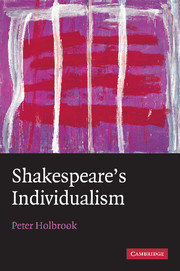18 - Calibanism
Published online by Cambridge University Press: 06 July 2010
Summary
Desire my pilot is…
The Rape of Lucrece, line 279.The Tempest has an exuberant, inspiring commitment to freedom. But underpinning, and somewhat qualifying, that exuberance is a severe, classical conception of liberty as rational self-government. This explains why the play's mood is joyous and emancipatory yet also rather sombre. However, The Tempest does not exhaust Shakespeare's views on freedom. Writers like Gide did not admire Shakespeare because he was a Platonist rationalist extolling self-government. In other texts Shakespeare is attracted to a bolder, wilder version of freedom, one emphasizing above all individual authenticity. His perspective on individuality encompasses Caliban's view of life as much as it does that of a soberly repentant Prospero. To put this differently: if The Tempest advances a ‘positive’ theory of liberty, other texts put forward a restlessly and anarchically ‘negative’ one. Even as some of Shakespeare's works raise the difficulty of how one comes to know one's true and authentic passion they also affirm desire, however dangerous, uncertain and ultimately incomprehensible it is. In order to begin a discussion of this topic, I need to return to two plays already touched on.
As we saw, A Midsummer Night's Dream addresses directly the question of authentic desire. Both the play's genuine tension and its light-hearted comedy circulate round this problem of how one recognizes true desire. Theseus announces the theme of desire at the beginning of the play.
- Type
- Chapter
- Information
- Shakespeare's Individualism , pp. 208 - 228Publisher: Cambridge University PressPrint publication year: 2010

